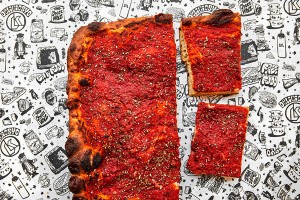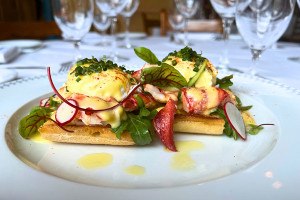The Semi-Secret Dinner Parties Reimagining Philly’s Restaurant Scene
Some of the city’s most memorable meals aren’t taking place in restaurants. They’re in living rooms and supper clubs and butcher shops, and the reservations are increasingly hard to get. Is this how we dine out now?
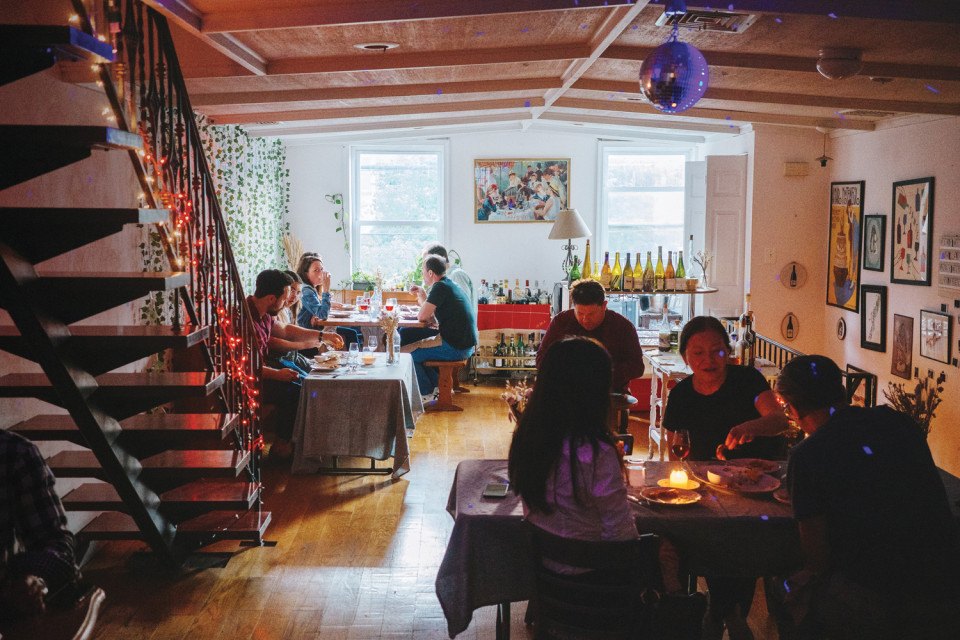
Dinner at Santé, a supper club hosted inside sommelier Dan Solway’s Bella Vista apartment / Photography by Paolo Jay Agbay
“I made you paella arancini,” Liz Grothe says to me with the matter-of-factness of a lunch lady divvying up peanut-butter-and-jelly sandwiches. As if what she’s doing is unremarkable. As if she hasn’t distilled the unmistakable flavor of the Spanish rice dish into spherical fried treats.
Grothe fishes out half a dozen arancini from a tabletop fryer on the counter. Golden, crispy and implausibly light, the rice balls are loaded with shrimp and fresh English peas, punched up with saffron and lobster stock. I eat mine in two bites. The idea to reconfigure the geometry of paella had never once crossed my mind, but blowing up tradition and making something anew seems almost instinctual to Grothe.
In 2018, she came to Philly from her home state of Oklahoma after watching a Bon Appétit video of its mustachioed on-screen talent eating 16 cheesesteaks in 15 hours: “I was like, ‘That’s disgusting; I want that. I want to live that life.’” In Oklahoma, she started her career as an industrial safety manager for a meat production company. It was the only industry she could think of that looked to be more dangerous than crabbing or logging. (Grothe had considered the other options, too: Logging “seemed fine” but wasn’t for her, she says, and there isn’t much crabbing to be done in Oklahoma.) Grothe continued on the path of meat supervision in a few cheesesteak factories around Philadelphia. The work became tedious, as perhaps you’re imagining it might.
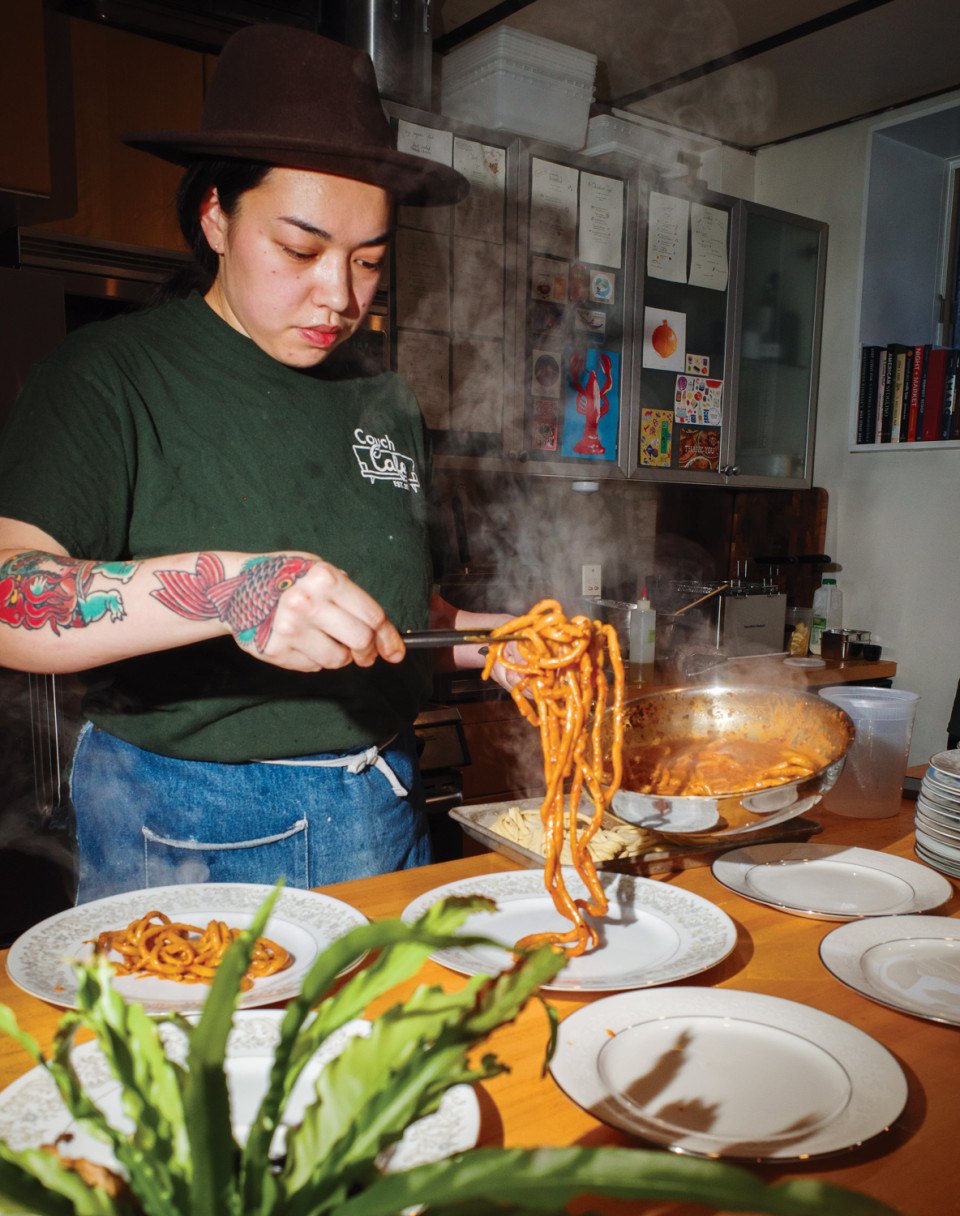
Liz Grothe plating sthridhlja at her Couch Cafe supper club
Then, one day during the pandemic, chef Randy Rucker of River Twice in East Passyunk posted on Instagram that he needed someone to fill in for a dishwasher who had called out. Grothe came knocking. She got hooked on restaurants, working her way up from dishwasher to processing collard greens and vacuum-sealing hay. Now she works at Fiorella, Marc Vetri’s tiny pasta spot on Christian Street in Bella Vista.
Only we’re not at Fiorella when Grothe feeds me paella arancini. We’re in her Northern Liberties apartment, a labyrinth of bedrooms shooting off a central living space. It’s the sort of color-blocked industrial rental that could work as a sound stage for New Girl or any analogous sitcom about millennials who never go to work. I’m sitting on a stool between Grothe’s kitchen and living room. Every month, or whenever she feels like it, she unloads the stash of folding chairs and tables from the coat closet and drags her roommate’s larger couch into the living room to turn the apartment into a venue called Couch Cafe.
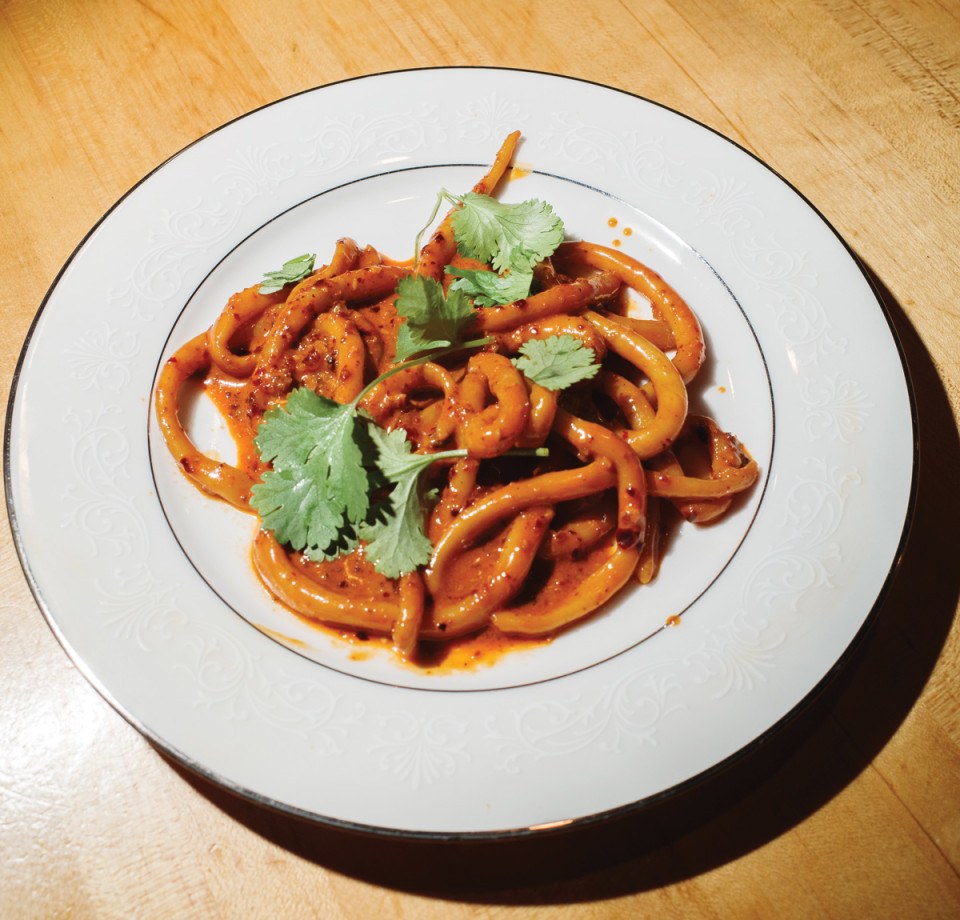
Sthridhlja with pecans and chilies in a salsa rossa
I’m here for “A Night in Lizbon, AKA a Big Ass Tapas Party.” Grothe dreamed up the two-hour Spanish-and-Portuguese-inspired meal with her friend Jakub Piven, who was raised in Spain and is now the sous-chef at My Loup.
When I arrive for my 6 p.m. reservation, secured weeks prior by filling out a Google form I found through a link on Grothe’s personal Instagram, I’ve already Venmo’d her $55 for the meal. Grothe says the price covers food costs and allows her to pay the three-ish industry friends who help her pour complimentary punch, wash dishes in the sink, clear tables and bring out plates.
In professional kitchens, Grothe’s job as a line cook has little to do with developing dishes. In March of 2022, she decided there was nowhere else in the City of Philadelphia where she could play around with the ideas swirling through her head. At the time, the chef de cuisine where she was cooking told her she could make menu decisions once she became the chef de cuisine of her own restaurant. But she says she wasn’t and still isn’t ready for that step. Right now, Grothe just wants to cook food that feels accessible and exciting to line cooks like her.
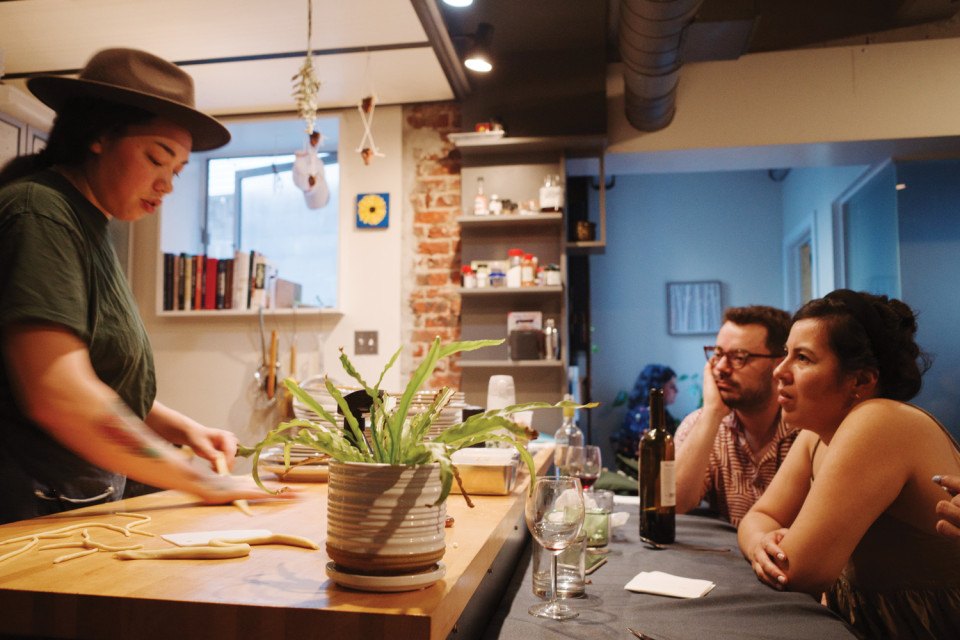
Line cook and Couch Cafe founder Liz Grothe serving diners in her Northern Liberties apartment.
“I feel like especially as a line cook, I’ve been screamed at by chefs who have to hide behind these smoke and mirrors to cover up their insecurities,” Grothe says. “So I hope Couch Cafe is just me. There’s no smoke; there’s no mirrors. It’s just the food that I want to eat.”
Couch Cafe is Grothe’s playground absent any vacuum-sealed hay: the makeshift restaurant she’s built for herself to serve Kentucky fried steaks during “Oklahoma” night — a love letter to her home state — or fettuccine Alfredo during “Spaghetti Western” night. She builds menus using the skills she’s picked up at River Twice, Oloroso and Fiorella, but without any cuisine restrictions or the ideological agitation of upscale dining. “Fancy food is kind of out right now,” Grothe says.
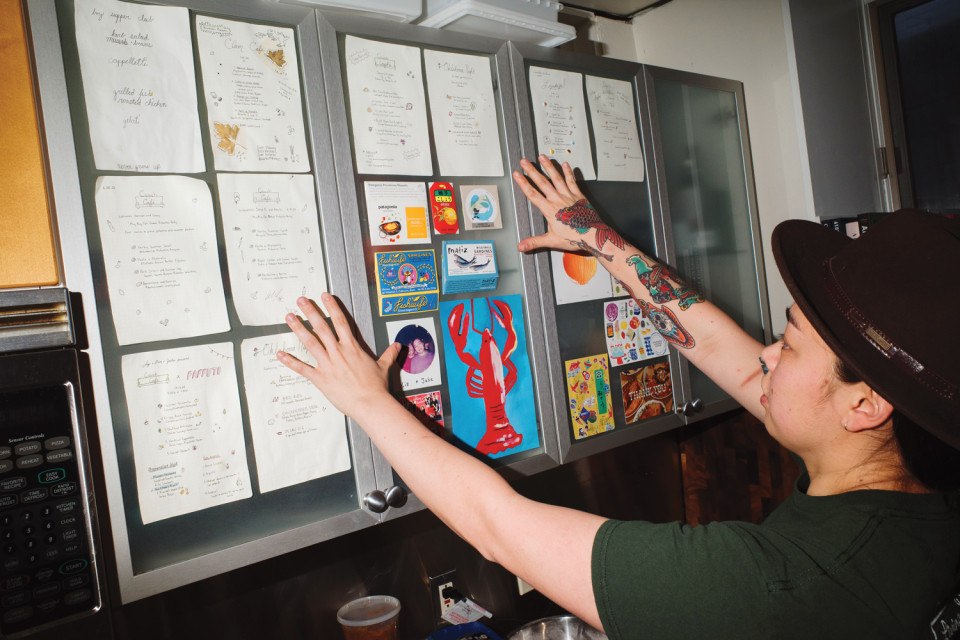
Liz Grothe in her kitchen with past Couch Cafe menus
The paella arancini is followed by plates of pan con tomate laced with boquerones, a wedge of tortilla Española, lobster escabeche served on Ritz crackers, crisp patatas bravas in a puddle of fire-hydrant-red romesco, prawns a la plancha still juicy in their shells. I eat each dish in astonishment. The $55 meal is one of the best I’ve had in months. I can’t entirely believe it’s happening in an apartment — that it’s happening at all.
Philly’s dinner-party dining tastes like a meal at your favorite restaurant and feels like a night in your friend’s kitchen. These events, hosted by people who cook and serve food for a living, put your Aunt Paula’s Pyrex gatherings of yore to shame. Meals are coursed out over the span of many hours, often served family-style and priced per person without choices or substitutions. Chefs collaborate on one-night-only dinners, buying and prepping the ingredients they need without worrying about waste and charging enough to pay themselves and their teams fairly. Dishes are conceptualized from a place of freedom, rather than served to appease a crowd.
There may never be another “Night in Lizbon.” But no worries: There are more Philadelphians like Grothe, throwing dinner parties behind apartment doors, inside the prep areas of charcuterie shops, down the stairs of deli basements, and in restaurants themselves.
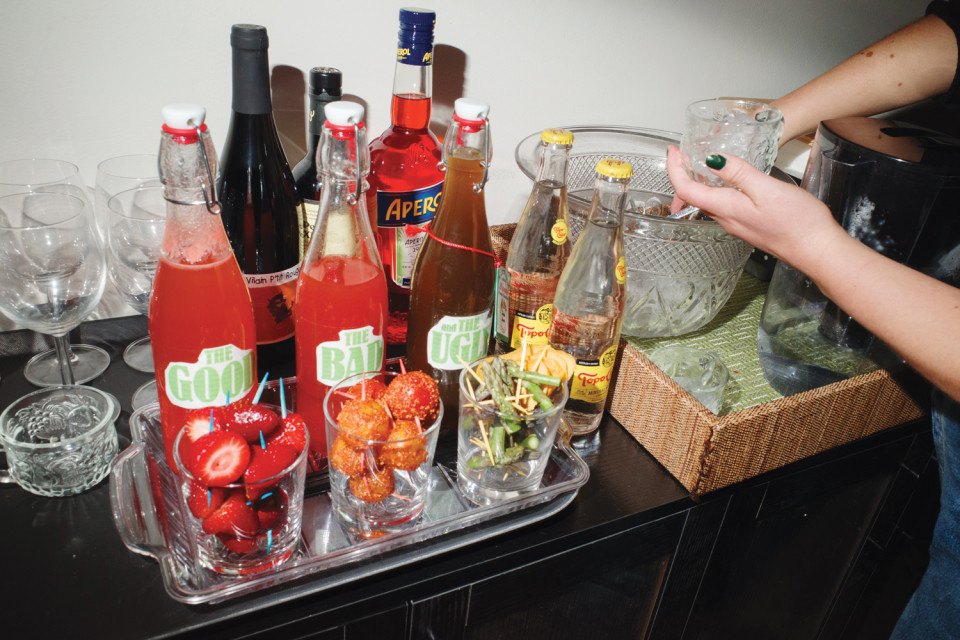
A complimentary Negroni bar at Couch Cafe themed to the spaghetti Western film The Good, the Bad and the Ugly
These events are designed to make Philly diners feel like we’re part of the meal’s architecture rather than just sitting pretty amidst it — like we’re friends with the chef, who’s invited us over for dinner, even if that chef doesn’t know us other than from a $75 Venmo transaction. In 2023, the promise of authenticity (and the idea of exclusivity) sells.
It’s a genre of dining for our moment. It’s the dawn of the anti-Zoom happy hour, with strangers willingly communing in tight, unfamiliar quarters — at least, diners who have the privilege of spending $55 to $100 on a meal in a sometimes unspecified location and consent to sharing plates of antipasti with people they met 40 minutes ago. If the prominence of the delivery app has proven there’s a demand for restaurant meals at home, the emergence of dinner-party dining takes that idea a step in another direction. You don’t have to go to a restaurant to eat grilled prawns from a chef. You don’t have to stay on your couch, either.
The genre occupies the gray area between staying home and going out, between the genuine intimacy of breaking bread and the performed intimacy of exchanging cash for being taken care of. It’s erupted at a time when luxury and comfort coincide and orbit each other like drunken single people at a wedding. In the right room, when the magic sets in and the BYOB wine flows, dinner-party dining can be social, intimate, improvised and unexpected in ways traditional restaurants could only ever dream of.
I meet my boyfriend outside Dan Solway’s Bella Vista apartment for an evening that may or may not go well. From the sidewalk, there’s no sign of Santé, Solway’s dinner-party series allegedly taking place inside. We may be the first ones to arrive, which would make us punctual angels in a restaurant but would possibly be mortifying at a dinner party hosted by someone I’ve never met. Should we knock? Should we just go in? A 30-something in jeans and a black puffer shows up and gives us a knowing nod. We follow him through Solway’s unlocked door to the living room and kitchen area on the second floor.
Solway greets us with a bottle of red wine in hand. Light refracts onto a disco ball twirling from the ceiling. A framed Ansel Adams landscape hangs under the stairs leading up to a third floor, which appears off-limits to guests save for trips to the bathroom. Vaulted ceilings make the apartment feel like a ship. There’s a couple sitting on a church pew. A playlist Solway describes as “jazz, acid rock, gabagool” fills the space. I spot a white cart with 14 bottles of amari neatly lined up like they’re waiting to be photographed for the high-school yearbook.
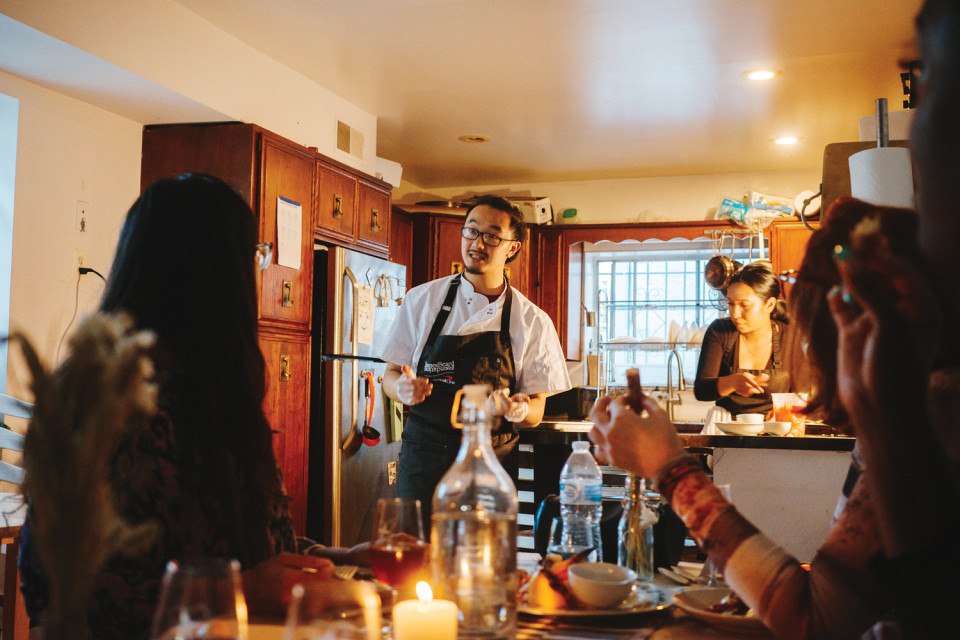
Càphê Roasters chef Jacob Trinh tells Santé diners about a pork-filled mochi dumpling partly inspired by his grandmother’s Vietnamese cooking.
In the kitchen, Jake Loeffler and Dan Griffiths, the chefs behind the pop-up project Paffuto, are getting ready to serve five courses of seasonal Italian-American food to 20 or so people, with a storage system that has only a single refrigerator.
Solway has made hosting dinner parties a full-time job. In addition to setting up and overseeing the events, he recruits a lineup of Philly chefs to cook in his home. Past Santé dinners have featured pop-up chefs including Nana Wilmot, Raquel Dang of Baby’s, and Tevon Tyrell of Hummingbird Island, as well as full-time restaurant chefs Jacob Trinh from the Vietnamese daytime spot Càphê Roasters in Kensington and Kevin McWilliams, a partner and chef de cuisine at Laurel in East Passyunk. None of these cooks run their own brick-and-mortar establishments, making Santé a fantasy space for restaurants that don’t quite exist but could one day. The common denominator of these dinner parties is Solway’s vision for the space: how people feel once they get inside.
“I love going into a restaurant and feeling like a good friend of mine has invited me to this party even if I don’t know anyone,” Solway tells me in a coffee shop near his apartment, months after my Santé dinner party. “I want people to feel like that when they come. Like, ‘Hey, it’s really good to see you. I don’t know you, but I feel like I know you.’”
Solway grew up in Mount Airy, where his parents would often invite strangers into their home for Shabbat dinner. The generosity of those Friday-night gatherings persists through Solway, who moved back to Philly from New York City to be closer to family after his mom died in 2020. “This project has been a way for me to try to stay connected to people and not withdraw and to channel the energy and philosophy that my mom had,” he says. “This is how I channel my mom and how I pay tribute to her and continue to show people the connective power of food and welcoming a stranger in a home.”
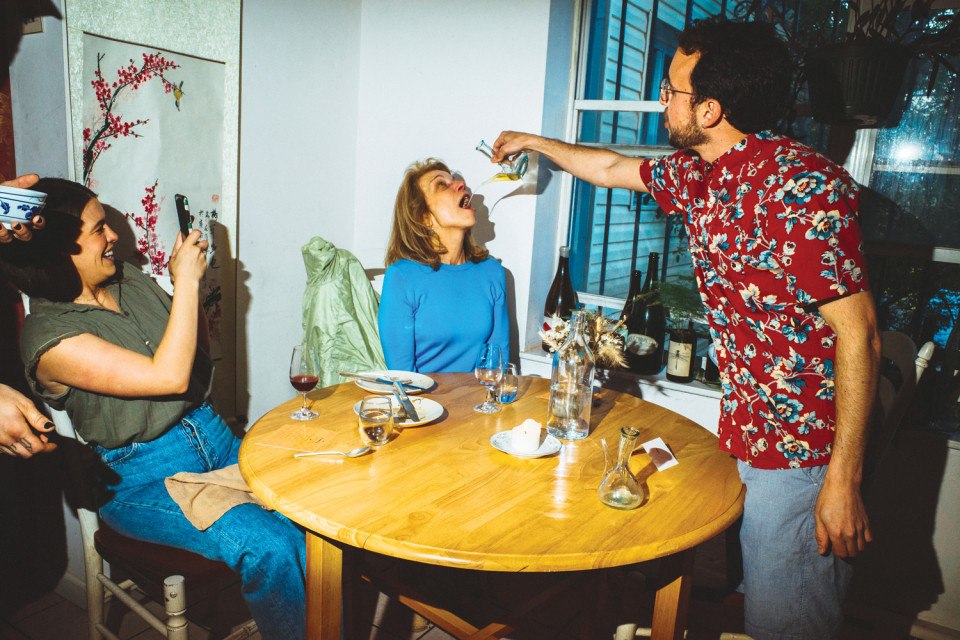
Dan Solway pours complimentary wine from his porrón.
Santé’s charm depends on the inevitable chaos of serving 45 guests over the course of two seatings in an apartment. A couple behind me is celebrating an anniversary at a bedside table masquerading as a two-top. Others sit with strangers at a communal table by the front windows looking out onto South 10th Street. Solway stops by each table to offer a complimentary waterfall of sparkling sauvignon blanc from his porrón, a Basque decanter with a pointy spout that makes it easy to pour wine directly into someone’s mouth. (Almost everyone in my sight line accepts a cascade of wine, thanks to self-confidence or low-level peer pressure.) A server named Ripley, Solway’s roommate and Santé collaborator, maneuvers through the space with plates of fluke crudo and duck confit. There’s an announcement from the duo of Paffuto men who are cooking the meal that their tortellini en brodo course didn’t quite work out, so we’ll be eating handmade fettuccine instead. Though the food is more thoughtfully made than the farro salad I’d be eating at home, it matters much less than the room we’ve coalesced in.
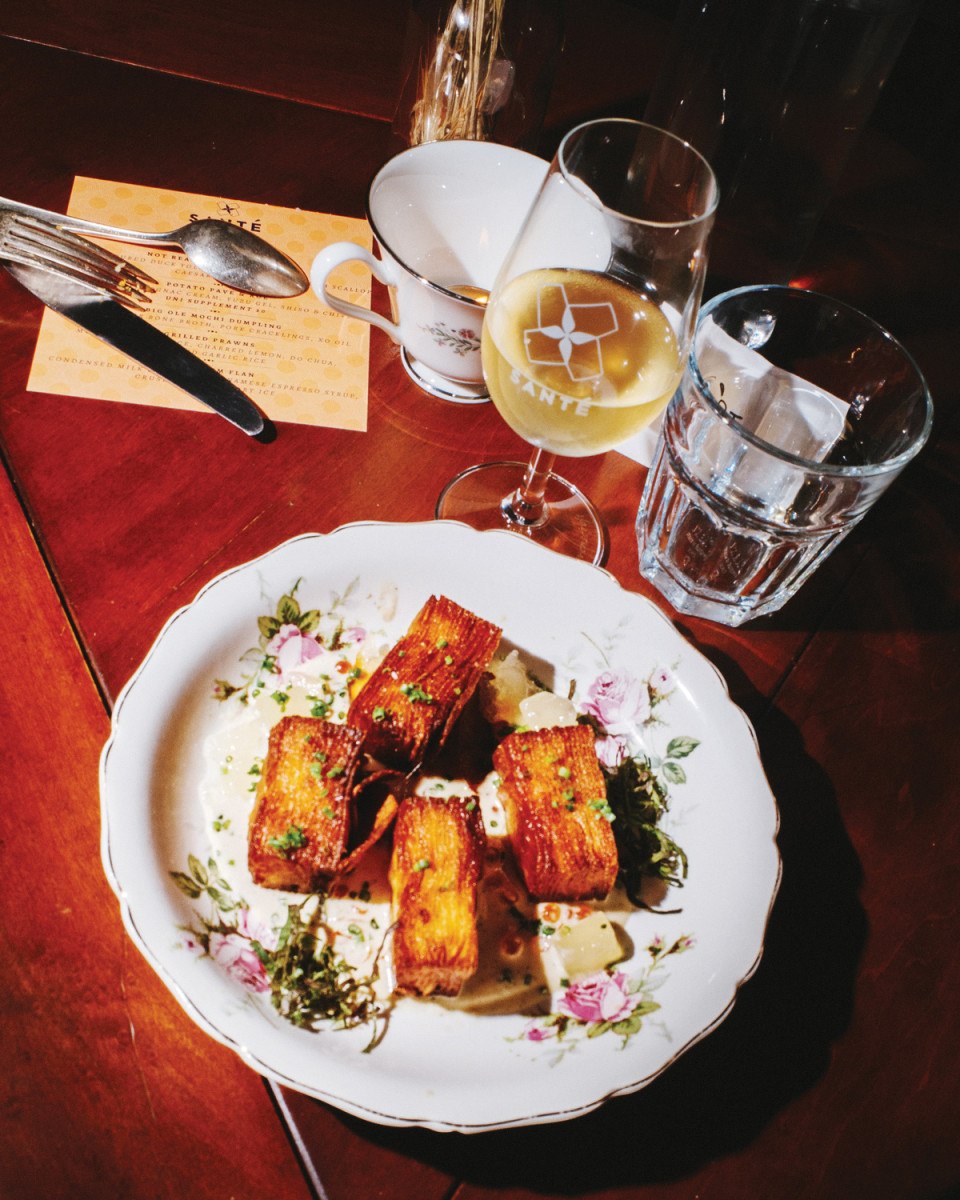
Potato pave with salmon roe, cognac cream, yuzu gel and chives
“I think people like the communal aspect of it these days,” Matt Budenstein says over the phone, the day after the Eagles lose the Super Bowl. He sounds emotionally hungover, if not genuinely hungover. “That’s something that everybody missed for years — sitting at a table next to a stranger, meeting people.” Budenstein is a partner at Liberty Kitchen in Fishtown, a daytime deli that specializes in tomato pie and very good hoagies. Before the pandemic, he and his team started hosting dinner parties in the deli’s prep-kitchen basement. Now, Budenstein says his dinner series — there’s one called “Sundee Gravy” and another called “Liberty Kitchen After Dark” — unlock his creativity beyond what he could do with the sandwiches and deepen the sense of community among his customers: “It’s kind of like dinner and a show. … It’s something special. It’s not just going to a restaurant; it’s a whole experience.”
Liberty Kitchen’s basement space has two communal tables (metal prep tables with wooden slabs resting on top) and a handful of red and white pendant lights hanging from the ceiling that look like they were looted from a ’50s diner. (The business is moving to a larger location in Fishtown but will continue to host dinner parties.)
When I show up for my Liberty Kitchen After Dark dinner, I don’t know what I’m getting into or with whom I’ll be sitting, but I figure the seafood will be worth the social anxiety. The meal is a collaboration between Budenstein and Melissa McGrath, the chef of Sweet Amalia Market in Newfield, New Jersey.
My table fills with seven strangers united by our enthusiasm for following McGrath into a basement, or anywhere, really, to eat her oysters. One couple has recently moved from Grad Hospital to Conshohocken. Another duo, a mom and her adult daughter, offers up some of their white wine to those who didn’t bring their own. We spend the meal swapping recommendations of where we like to eat in Philly and admiring the swordfish roulade and hoagie-style baked oysters that McGrath is plating two feet from us.
The second communal table is occupied by Palizzi Social Club bartender Jorgen Eriksen, who’s celebrating his birthday with friends and co-workers. At the end of the night, Cry Baby Pasta bartender Sam Pritchard comes over to dole out nocino he’s made using black walnuts foraged in FDR Park. By this point, McGrath has finished cooking and breaking down her station and is drinking wine with the birthday boy.
At $100, inclusive of tax and tip, my dinner in Liberty Kitchen’s prep-kitchen basement is priced on par with some of Philly’s most sought-after dining experiences. It’s just as memorable, if not more so — irreplicable outside of this particular Fishtown basement on this particular night.
During the pandemic’s years of disruption and loss, pop-ups and underground dinner parties took hold of Philly’s restaurant scene. Even when restaurants came back at full capacity, underground dining — the not-really-restaurants, the one-off pop-ups, the kinda-sorta Big Nights Out — didn’t stop.
By 2022, dinner parties were following me into every digital crevice of my life. They were in my inbox (“Hi Hannah, Shake Shack is taking its fine-dining-inspired White Truffle menu to new heights by launching The Truffle Table. … [Shake Shack] will transform one table into a fine-dining setting complete with table service, fine china, a white tablecloth and prix-fixe tasting menu”), in texts (“This looks cool, wanna go? LOL but it costs $75 and it’s in some guy’s house. Worth it?”), and on Instagram (posts showing flier invites, accounts dedicated to supper clubs with regular meetups, promotions of companies renting Philadelphians dinner-party essentials).
So late last year, upon receiving an invitation to what I understand to be the most enticing celebration in Christianity’s events repertoire — a Feast of the Seven Fishes dinner — I couldn’t say no. The party would occur inside a closed meat shop and deli in deep South Philly called Heavy Metal Sausage Co.
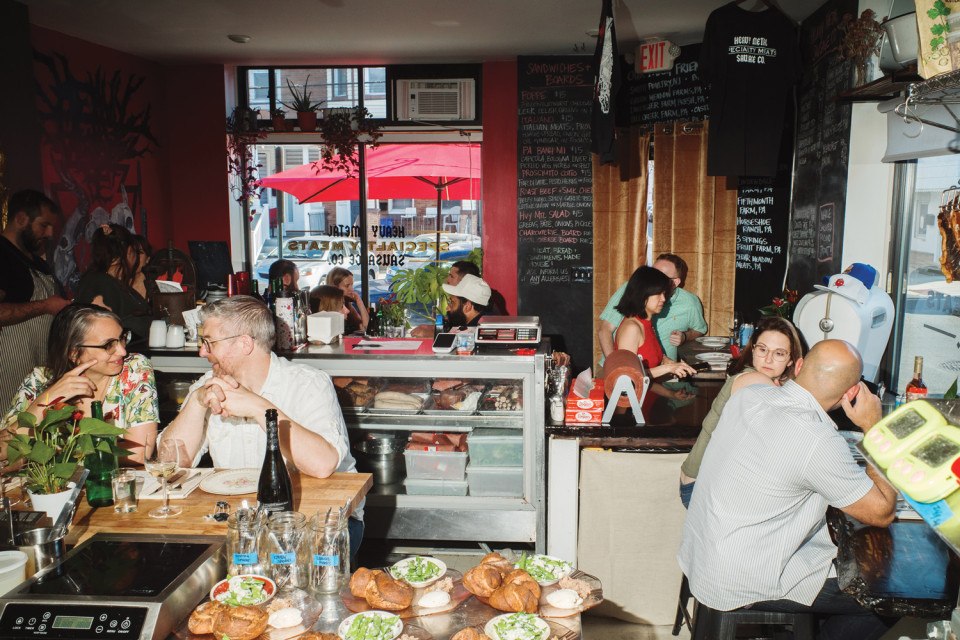
Heavy Metal Sausage Co.’s Trattoria dinner in South Philly
When Patrick Alfiero and Melissa Pellegrino first drafted a business plan for Heavy Metal Sausage Co., the couple knew they wanted to serve communal dinners in addition to selling handmade sausage, charcuterie and sandwiches during the day. But as the opening process continued, reality set in. Alfiero and Pellegrino were largely funding the project themselves and couldn’t afford to rent a space with a dedicated dining room and a deli counter. They improvised. Six months after opening, they started offering BYOB Italian dinners in the deli on Thursday and Friday nights for $75 a person. Trattoria meals are rustic, grounded in the philosophies of local sourcing and do-it-the-long-way craftmanship; imagine a nonna who went to cooking school and a lot of punk shows in West Philly basements decides to invite you over for dinner so she can feed you until you’re stuffed and spiel about how industrialization and automation are closing the city’s butcher shops. That’s the energy of a Trattoria meal at Heavy Metal.
I think that everybody really secretly wants things to change, but they don’t want to be the ones to be the change.” — Patrick Alfiero, Heavy Metal Sausage Co.
“We wanted to do something that would allow us to use everything from the shop,” Alfiero tells me as he hand-works a mixture of bright-red pork that will eventually grow up to be blood sausage. “Like, we’re butchering animals, but not everything can go in the shop.”
These prix-fixe dinners, like the Feast of the Seven Fishes event I attend, move through family-style courses of bread and antipasti, two or three seasonal vegetables, a few pastas or risotto, a big ol’ protein with a side, and dessert. Some guests perch directly in front of Alfiero as he plates focaccia with pork liver mousse, cooks 12 portions of homemade mafaldine on a single induction burner, and pulls trays of cold-smoked monkfish from the oven. Pellegrino knows what guests need before guests know they need it and chats about wine. (She tells me the Trattoria has developed a serious following of regulars who bring high-end bottles from their cellars and share with fellow wine hardos.)
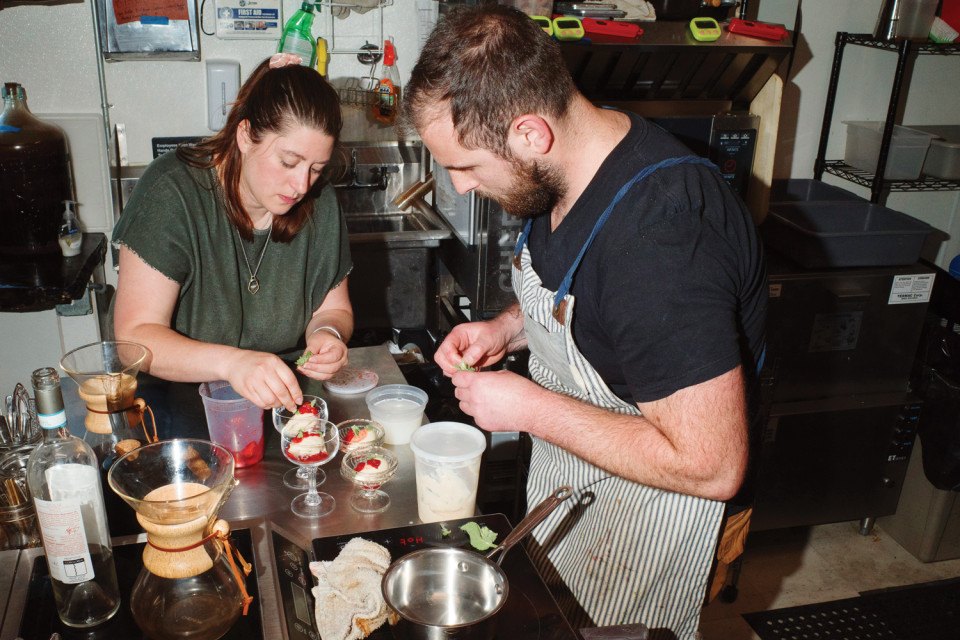
Heavy Metal Sausage Co. owners Melissa Pellegrino and Patrick Alfiero plate dessert.
Heavy Metal’s Trattoria dinners are delicious and fun for diners, certainly. But they also offset the high production costs associated with running the shop. “We’re barely making any money. The Trattoria is the only reason that we make anything,” Alfiero says. Before dinner, he and Pellegrino calculate exactly how much food they’ll need to prep and therefore exactly how much money they’ll make as a result of the 12 to 15 hours of labor required to get everything set.
Managing the economic flow of their two operations — and selling out dinners consistently — means Alfiero and Pellegrino can run their business according to their own rules. They don’t have to follow a traditional restaurant model in order to make the esoteric blood sausage of their dreams and get butts in seats. “Without the pandemic, I don’t know if this dining style would have evolved as quickly as it did,” Alfiero says. “Because I think that everybody really secretly wants things to change, but they don’t want to be the ones to be the change.”
When Amanda Shulman opened Her Place Supper Club, the Rittenhouse restaurant wasn’t supposed to be the dinner-party dining destination we know it as today. Originally, Shulman hoped to run an energetic neighborhood spot with à la carte service as well as an off-menu option for the chef to design a meal for guests, similar to Joe Beef in Montreal, where she’d worked, and My Loup, the Walnut Street restaurant she and fiancé Alex Kemp Roussy launched together this spring. Shulman saw 20 different commercial spaces. Nothing fit.
She eventually signed a two-month lease on a former pizza shop in the stretch of Sansom Street where people park their BMWs to eat at Parc and reimagined her concept: She’d sell high-end lunches to people who wanted to have fancy picnics in Rittenhouse Square. Two weeks before opening, just as she was about to spend $4,000 on display fridges, instinct told her to stick to her roots.
As a sophomore at Penn, she’d invite friends of friends to her campus apartment for five-course meals (in one instance hauling an entire pig from Esposito’s in the Italian Market). By the time she was a line cook, she’d already fed hundreds of people by herself: “‘I think the biggest thing was not being scared to come up with a menu and cook people a meal. … I would be in kitchens and I would be like, ‘Wow, this person could kick my ass on the line.’ But they could not cook a dinner party, because they were so focused on a dish.”
(It appears to be an open question to what degree some of these restaurant alternatives comply with local regulations. The city’s License & Inspection department says that in its view, a chef who regularly cooks for guests in a private home is running a business.)
Even as Shulman rose through the ranks of professional kitchens at the likes of Amis and Vetri in Philadelphia and Momofuku Ko and Roman’s in New York City, casual-communal service always felt most natural to her. At a dinner party, she could see every stranger eating her porchetta or chocolate cake; she could talk to guests like people with real personalities and questions, rather than having to stay hidden and hope everyone enjoyed the dinner.
“I always had this concept that the best meal you could get would be at a chef’s house,” Shulman tells me. “Maybe I don’t want to go to Bobby Flay’s restaurant. But if I’m at Bobby Flay’s house, I’m going to have the best paella and the best steak, and I want to have whatever he’s making me. So I was like, ‘Okay, how do I make that?’”
At Her Place Supper Club, she and a small team cook five courses of French- and Italian-leaning dishes and serve them on vintage floral plates. The only things keeping the kitchen from spilling out into the dining room are the metal counter and the sense you’re in good hands. Each meal begins with an explanation of what you’re about to eat — the farms where the beets were grown, how eager Shulman is for you to try the ramp ranch on top of a popcorn shrimp dish, or how she thinks the team has finally perfected the mushroom pithivier with porcini demi-glace. When the check arrives, diners leave love notes in a passed guest book and help themselves to sourdough chocolate chip cookies handed out to every table, still warm.
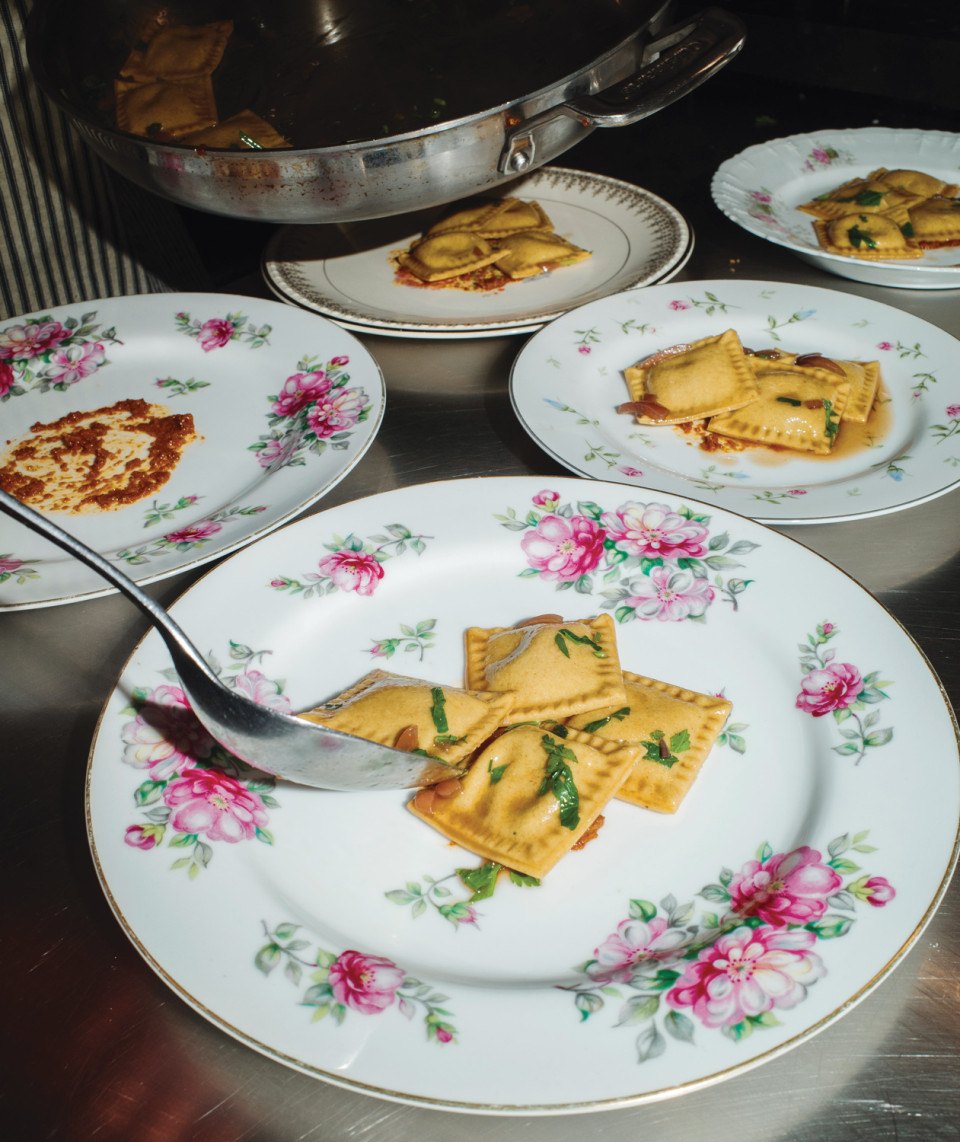
Homemade sheep ravioli
If you’ve ever tried to eat at Her Place Supper Club, you’re already aware that reservations don’t come easy. In fact, the demand for dinner here is so high that Shulman and her staff can opt out of weekend service and enjoy time off beyond the industry’s typically rigid hours. “People in Philly are okay with following things that haven’t hit, like trying new things. People love that,” Shulman says of the early wave of customers who supported Her Place. “I was surprised. It was so makeshift, I just couldn’t believe it. … This is what people need.”
It’s possible dinner-party dining would have caught on in Philly, the way it has in New Orleans and Brooklyn, even if Shulman had pursued her dream of serving picnic-basket food to Rittenhouse Square denizens. Not unrelated to the trend of pop-ups, dinner parties are a reaction against business as usual in the restaurant industry, where opening your own spot is prohibitively expensive, hours are long, and hierarchies are firm. A tasting menu gives a chef autonomy. Remove the association with white-tablecloth glitz, and you’re left with a model that affords operators more opportunities to control profits and express themselves on a plate.
Her Place Supper Club proved that diners would say yes to paying for a tasting menu in a room that looked nothing like the top of the Comcast technology center, and the trend accelerated. Heavy Metal Sausage Co.’s Alfiero and Pellegrino credit Shulman’s business with giving them confidence that a small, DIY prix-fixe model could attract crowds — that diners of a certain age and tax bracket prefer face-to-face interactions with cooks and servers rather than to ignore them (as if the duck confit came from a black hole behind the swinging kitchen door). Restaurants like Roxanne in Bella Vista, where chef Alexandra Holt cooks dinner all on her own, and Miss Rachel’s Pantry, a vegan supper club in South Philly, are some of the hottest reservations in town.
If the meals inside apartments and delis and these restaurants themed around the intimacy of one person cooking are selling out, it’s because the restaurant scene and the comforts we want from it are changing. While many of the dinner parties mentioned in this story might not be accessible to the average diner on the average night, they still cost significantly less than your check at many of the city’s iconic fine-dining restaurants. In 2023, luxury dining isn’t limited to spending hundreds of dollars on flawless meals. Luxury dining means feeling like you belong.
Dinner parties offer up a new set of restaurant experiences to collect and discuss with friends, a chance to connect and eat with people in a familiar-but-not-too-familiar place — at least, for those of us who are willing to take a gamble on a meal that might not be technically perfect according to Michelin standards. We’re comfortable with the idea that restaurants needn’t be perfect. They should be human.
So, are you coming or not?
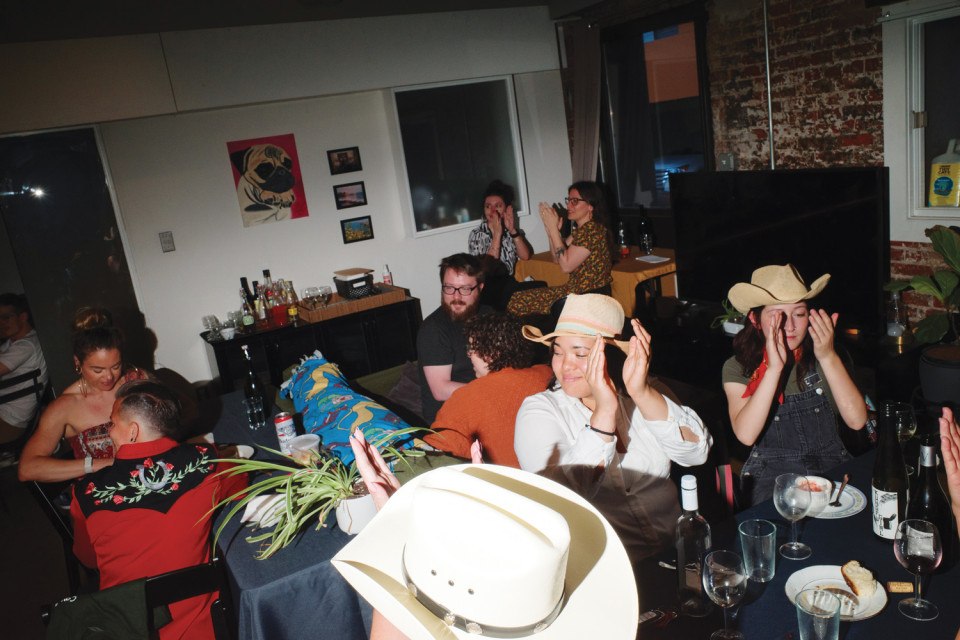
“Spaghetti Western” night at Couch Cafe supper club / Photograph by Paolo Jay Agbay
How to Choose the Right Dinner Party
Dinner-party dining comes in many shapes and sizes. They’re all a good time, but they may not all be the right kind of good time for you. We break down your supper club options.
Restaurants serving dinner-party-esque meals
In addition to such options as Her Place Supper Club in Rittenhouse, Roxanne in Bella Vista, and Miss Rachel’s Pantry in South Philly, try the intimate tasting-menu meal at Messina Social Club for $95. You have to be a member (or know one) to get in. (Email the club to inquire.) Looking for something a little more old-school? Try to get into Mr. Martino’s 2.0. After co-owner Marc Farnese passed away in 2021, his wife and business partner, Maria (and the rest of the Martino girls), started to throw monthly pop-ups in the restaurant’s space on Passyunk Avenue. To snag a table, you have to call the restaurant. Beware: The answering machine might be full.
Dinner parties in homes
Dan Solway and Liz Grothe’s dinner parties aren’t the only ones taking place in private residences. There’s also Boy Supper Club, which often donates some of the proceeds to nonprofit organizations, as well as & The Table, where local host Alex Cahanap brings together six women who don’t know each other for a meal.
Dinner parties inside businesses
Maybe you’re interested in this whole “underground dinner-party dining” thing but prefer to eat in a place where no one sleeps (a fair request!). There’s a middle ground for you to explore. Chef Shola Olunloyo hosts private and public parties in a “culinary laboratory” space in South Philly’s Bok Building, while Thursday and Friday nights at Heavy Metal Sausage Co. are dedicated to its Trattoria dinners. When Liberty Kitchen moves into the old Good Spoon space in Fishtown, it will continue to host small family-style meals.
Published as “Party Crashers” in the July 2023 issue of Philadelphia magazine.
